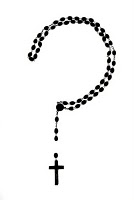
It may at first seem contradictory for an atheist to become an online ordained minister in order to officiate his friends' wedding after all, marriage is, at least for the traditional Catholic or Christian, a holy sacrament and a compact between bride and groom on one hand, and God on the other. What, then, would drive somebody who rejects not only religion, but also belief in God, to don the title 'Reverend' at his friends' behest? Perhaps the role of minister is not fixed, pre-determined, or dictated, but lies in the minister's own hands and can be molded by that person to fit the unique needs of the clergy and lay members concerned.
This seems to be the attitude of Irish-Jewish atheist Jason O'Bryan, who became an ordained minister online with Universal Life Church Monastery in order to fulfill his friends Vissy and Harry's request to perform a non-traditional, modern wedding ceremony for them. His first thoughts, he admits, were, "what an incredible honor" and "how absolutely insane". Like most ministers with ULCM, O'Bryan didn't know the first thing about how to officiate a wedding indeed, in many people's minds, a highly theoretical knowledge of theology still seems to be a prerequisite for performing wedding ceremonies. Even though he moved beyond his own personal distaste for religion and marriage for the sake of his friends, O'Bryan asked, "What the fuck do I know about weddings?" His friend Harry's response was a resounding, "Who cares?"
Such a reply challenges even non-theists to re-consider what it truly means to be a minister and to re-think the most important, meaningful contributions a reverend can make. Harry and Vissy reminded O'Bryan why they wanted him to get ordained not because they wanted him to become a conduit of God and communicate divine approbation of their union, but rather because they wanted a friend, somebody they understood and cherished, to articulate their love for one another. As the bride-to-be herself pointed out, "Why would I want some stranger leading one of the most important days of my life?" It seems like common sense in the view of a growing number of modern-day couples, the very reasons for selecting a wedding officiant is familiarity and first-hand experience, not traditional priest and minister training. O'Bryan acknowledged this point by composing an entirely original speech and set of wedding vows to reflect his friends' unorthodox outlook on the role of ministers and the purpose of weddings:
The speech ended up as a collection of small, sweet stories about them as a couple, stories that, when taken in aggregate, explained why they were perfect for each other. It was rounded out by a citation of faith not to [sic]a God in which neither of them believed, but in their love, in each other and the future.
It would appear that now, in our postmodern world in which the complexities of race, class, and gender continue to defy our expectations, even the role of the clergy is being turned upside down on its head. As philosopher Judith Butler argues, "identity is performatively constituted by the very 'expressions' that are said to be its results" in other words, what it means to be a minister is not a predetermined notion; it is created by the minister herself in the way in which she chooses to define and carry out her ministry. Certainly belief in God will remain essential to the role of most ministers for a long time to come, but in the end, there is nothing actually contradictory about an atheist minister, since the function of a minister can be determined by such an individual himself. What we are left with is the portrait of a more relevant, accessible, accommodating wedding officiant.
The idea that traditional roles are relative and malleable can be re-assuring for newly ordained ministers who fear for their integrity, worry about impediments created by wedding laws, and ponder the legal status of online ordained ministers. But as the market evolves to allow for greater creativity and interaction between vendor and consumer, aspiring ministers will be surprised to find that they have the very qualifications that their clients seek relevance, practicality, and a uniquely personal touch.
Browse our Guide to Divinity to learn more about atheism and non-theism.
Source:
_The Boston Phoenix_


I'm an Atheist and wanted to learn if I could marry my friends. Thank you for this information.
I am an atheist woman and I just married my friends.